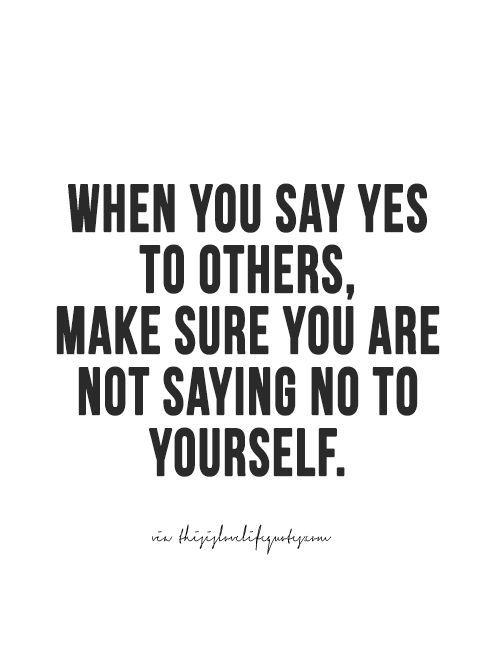Saying no to commitments
- by Elizabeth Gresson
- •
- 29 Aug, 2019
Your house may not be cluttered, but what about your schedule?

My mother moved house – from England to Scotland – because of one word she was unable to say. That word was No.
She lived in a little town and was an active member of the local church. As well as attending Sunday services, she took part in Bible study groups and helped out with various events. She was the go-to person whenever help was needed, for the simple reason that she always said yes. However, as time went on she began to resent these calls on her time. That made her feel bad, that she was being selfish. She had never learnt that it was OK to put her own needs ahead of other people’s. In the end she moved hundreds of miles away to a place where no-one knew her and she could start again.
Many of us struggle to say no, to set boundaries on what we do for other people. We may struggle to accept that our own needs are important and take priority. However, we can’t give from an empty vessel and if we run ourselves ragged doing things for other people, we diminish our effectiveness both to ourselves and to others.
Things to think about when we’re asked to do something:
· It’s not just about the time, it’s about our capacity. Most of us can find the time, but are we filling our lives with commitments to other people, leaving no space and energy for ourselves? Trying to do too many things means we can’t give our best to any of them and we may find ourselves neglecting our responsibilities to ourselves, in terms of our own wellbeing.
· You’re not the only one. Sometimes when people ask us to do something, they apply subtle pressure by implying that if we don’t come on board, the event or activity won’t be able to take place or continue. My mother was always the first one to be asked because she always said yes. If she had said no, the people asking her would have had to ask someone else. Maybe someone who had more time, someone who wanted to be involved but hesitated to put herself forward. Someone who felt that it was always the same people who were involved and there was no room for her. Someone who might have brought a fresh perspective and new ideas.
· Don’t be bounced into giving an immediate response. Always ask for time to think about it. Remember, it’s always harder to get out of something once you’re committed.
· You don’t have to go the whole hog. Rather than agreeing to commit indefinitely, you could specify a period to be involved. If a regular commitment wouldn’t work for you, you could agree to help out at one event for a specified time (for instance, help out at the school fair for two hours, rather than join the committee with weekly meetings for several months.)
· No is a complete sentence. However, many of us find it hard to say No, baldly, just like that. I soften it by saying “No, that wouldn’t work for me” or “No, not this time”. I don’t elaborate or make excuses as that can open up a debate where you find yourself having to justify yourself. I don’t apologise either – that implies that I’ve let someone down by not agreeing.
The more you practice saying no, the easier it will become. In addition, you’ll learn more about yourself and what your real wants and motivations are. Doing things for the right reasons will make you more effective with the commitments that you do choose to take on. Then everyone will benefit.



These are probably the two most common questions I’m asked when I speak to a potential client.
When I help clients I work to their agenda, not mine and they will always have control over the process. I don’t tell them how we’ll work or what we’ll keep. We start where they choose, in the area that’s causing them the most problems. It could be that a bedroom is so full of stuff that they can no longer sleep there. It may be that they have books spread all round the house and they want to make space in one room to put them all together. They may have a garage stuffed with boxes which still haven’t been unpacked from when they moved in several years ago. Their house may be ordered and organised but they’re paying monthly fees for a storage unit full of stuff which they want to sort through.
We start by going through their thing and I ask them to decide what they want to keep. When I ask them about an item, this gets them to really think about it and what it means, if anything, and enables them to make a decision about whether to keep it or not. One client told me that this process made him accountable. Not to me, but to himself.
The process can take time. I worked with a client who found it very hard to let go of certain items of clothing. She knew she wouldn’t wear them again - they came from a time of her life that was over, but the decision was still hard to make. With some items we spent 20 minutes talking about each one before she was able to let them go. At the end of working with me, she told me she had found it “therapeutic”.
I can encourage decisions and provide some perspective, but the choice is always the client’s.
Most people are (rightly) concerned with the environmental impact of their decluttering. Many of them though, don’t know the wide range of things that can now be repurposed and recycled. I do know, and I’m able to reassure them that most of what they let go can be reused in some way. I don’t believe though that a desire to keep something out of landfill warrants holding onto an item if that’s the only reason to keep it.
So, if you want to get the clutter cleared but are anxious about working with an organiser, be reassured that with me it is a gentle process where you won’t come under any pressure or have any judgments made.
Contact me for a free half hour consultation and see how I can help to get it All Organised for You!

Many of us have things in our houses which have a story attached to them. The Chinese vases that Great Uncle Harry brought back from Hong Kong; the clock grandfather was presented with when he retired; the silver napkin rings which were a wedding present; or the chair that was in the hall of an old family home. When we’re in the position of having to consider what we have - maybe for a house move - we often enlist the help of our families. They too know the back story of these items and they are just “Uncle Harry’s vases”, “the chair from Albion Road”, or “grandfather’s clock”. There is no thought or consideration about why we have them and often we don’t see them anymore. They’ve just always been there. Other family members wouldn't want the items in their own houses, but they are reluctant to see them discarded because of the obligations of the back story.
When I work with clients, I don’t know the history or associations of any of their possessions, and I will simply ask about that clock, those pictures, that ornament. When a client tells me the story, it’s like talking to a therapist who is completely detached from it. As the client starts to tell me about the background of how Great Uncle Harry, or their grandfather acquired the item and how long it’s been in their house, they start to ask themselves the significance of it. Maybe Great Uncle Harry was their husband’s relative, they never met him and actually they don’t like the vases very much. The clock may have a loud annoying tick and is kept in a cupboard and never wound up. Once they have worked through the process of considering the item and its meaning to them, they very often then feel able to let go of it. They can tell family members that they don’t want it any longer, and if the rest of the family feel strongly about it, one of them can take it. Not surprisingly, when confronted with this, the family members often agree that it can be sold, or just given away.
For me, decluttering is about making mindful, intentional choices about what we have in our houses. Our homes are about us, what’s important to us and what we value. It shouldn't be about holding onto things from an obligation to other people. I wouldn’t want to think that someone kept something in their home that they didn’t like, simply because I gave to them, or that my children felt obligated to keep possessions of mine that mean nothing to them. I would prefer that they passed it onto someone who valued it and actively wanted in their home.
So, give yourself permission to let go of the things that you’re only keeping because of their back story and only have in your home the things that mean something to you. If you want my help to support you through the process, get in touch and let’s get started!
